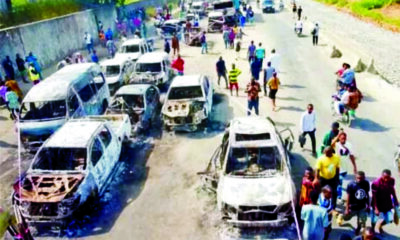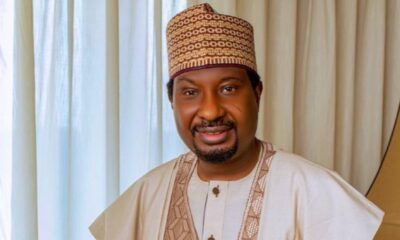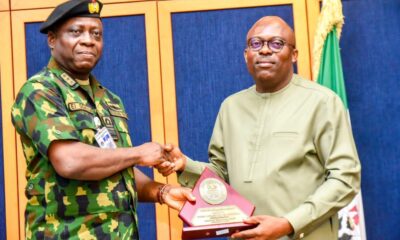Opinion
The Bar And Hijab Brouhaha
Indeed, what goes around comes around! Sometime last year, there was an uproar over the quagmire involving a student of the Nigerian Law School, Amasa Firdaus who insisted on wearing Muslims’ hijab, contrary to the policy of the Council of Legal Education (CLE), and as a result, was denied entry into the auditorium for the call-to-bar ceremony.
The development created factions in the bar; some emotionally backed the student on account of the fundamental human rights especially Sections 38(1)and 42(1) of the 1999 Constitution of the Federal Republic of Nigeria, as amended which provides for right to religion among others. Others seemingly in the majority vehemently objected, perched on the side of the Council, insisting that a formal dressing for call-to-bar ceremony is sacrosanct.
The President of the Nigerian Bar Association (NBA),A.B. Mahmoud (SAN) in particular, received an overdose of criticisms from colleagues for standing for the embattled student, arguing that hijabs are permissible for lawyers in similar convocations overseas.
Parochially, the judgment of Court of Appeal in 2016 against Lagos State Government presided over by Justice A.B. Gumel which affirmed wearing of hijabs in public schools would be in favour of the dramatis personae; a judgment which the court never envisaged could one day affect the judiciary. Hence, a great lesson on fallacious decisions and actions.
By the appellate court’s verdict, students now have unfettered rights to wear hijabs in public schools that are distinct from missionary schools pursuant to fundamental human rights. And unconsciously, the court set a wrong precedent forgetting that folks that live in glass houses do not throw stones. Incidentally, the stones first landed on the bar. It’s therefore indicative that the appellate decision may have to be challenged at the apex court for a clearer position.
Who takes the blame? Of course, the judiciary solely created the catastrophe, interestingly, this time against itself. As a matter of fact, if the blunder is not carefully revised, a religious bigot-practicing lawyer may, after this episode, stand on the appellate decision to appear before a court either in hijab or in cassock if the person is a Christian. Indeed, this is not a good development for the judiciary.
On the other hand, looking at the quandary holistically, precisely away from the appellate court’s commission or omission, the action taken by the CLE in refusing entry without formal dressing was apt and philosophical.
This position is logical on account that the law school is exclusively the training place for practicing lawyers under the Nigerian legal system. And customarily, to practice in Nigeria requires dressing code before the court unlike in the United Kingdom and United States of America referred to by the NBA President.
The call-to-bar is the final stage for assessment, and therefore, logical that students endorsed for practice should appear professionally fit in sync with the ethics of the profession. As a profession, legal practitioners have stipulated ethics, ethos and etiquettes which include dressing code in the court.
Obviously, subjecting the matter to religion is disappointedly, completely out of it. This is because the embattled student wasn’t clogged by the Council from practicing a religion of choice even in the law school; rather, there was an attempt to allow religion substantially interfere with professional ethics. It is a trite rule that professional bodies established by law have rules and regulations guiding them.
In the Bible, for example, it is encoded as a fundamental principle in Matthew 22: 21, “render unto Caesar the things that are Caesar’s; and unto God the things that are God’s”. This was laid down in resolving a similar dilemma among the people on rules to keep.
Sensitively, the judgment of the Appeal Court albeit flawed, nonetheless, a professional body like law alongside law school cannot competently be included in the category of public schools for freewill dressing and attires. In the primary, secondary and university education, the judgment may manageably survive for some time but unrealistic for the law school that is for vocational training.
It is akin to relying on the same fundamental human rights to question a management for denying its member of staff entry into a factory without designated dressing pattern.
On the way forward, religious bigots should draw a red line between a profession and religion. The right to practice any religion, though fundamental in the Constitution, is clearly not to the extent of overriding professional ethics. Can the two coexist without prejudice? Emphatically yes. Simply, wear all desirable religious apparels and costumes everywhere except during conventions by professional bodies like call-to-bar-ceremony. This is the marginal note of the apothegm, ‘live and let live’.
It is equally imperative to note that the freedom guaranteed by fundamental human rights doesn’t accord unrestrained liberty. To belong to a professional body has a price, and this is, on the other hand, where the freedom to belong to associations or professions is determinable by individuals.
In Nigeria, to become a practicing lawyer, to garb wigs alongside gown is inevitable and the only remedy is to terminate legal studies at the universities as academic lawyer. But for practicing lawyers, professional ethics which include dressing code is unavoidable.
Umegboro, a public affairs analyst, wrote from Lagos. umegborocarl@gmail.
Carl Umegboro
Opinion
Other Sides In Junior Pope’s Death

The tragic boat mishap of Wednesday, April 10, 2024, which claimed the lives of popular Nollywood actor, Mr John Paul Obumneme Odonwodo, popularly known as Junior Pope, and four others, has sent shock-waves across the Nigerian movie industry, and set the social media buzzing with reactions.
A contingent of 12 movie crew members had set out for a boat journey from the River Niger Cable point, a waterside jetty at Asaba in Delta State, to cross to the other side of River Niger, into Anam, a riverine community in Anambra State, for the shooting of a movie set titled ‘Another side of Life’ produced by Adanma Luke. Unfortunately, a series of avoidable events culminated the journey into an ill-fated expedition that sent fives lives to ‘the other side of life.’ The incident made the movie’s eventual ban a nullity, having played-out its symbolic meanings in real life while in the making, rather than on envisaged screens.
An avoidable incident, it exposed our society’s casual attitudes towards marine and general safety, as well as our endemic superstitions, while telling, on several flaps, other side tales of reality in the accounts of what transpired during the production, or rather, play of Adanma’s ‘Another side of Life.’
While veteran actor and Senior Adviser on Military Relations to the President of Actors’ Guild of Nigeria, Mr Steve Eboh, claimed he missed joining the ill-fated boat because he arrived too early before the crew, and had to go back, the producer, Adanma Luke, claimed she missed it because she came too late.
A journey’s jolly take-off from Asaba, Delta state, which ended tragically in its return from the other side in Anambra State, proved to be a rascally journey that showed the other side of rascality, even as T. C. Okoye claimed that pre-performing of obeisance to some marine spirits saved his life. But it was T. C. Okoye who had to hang unto a boat’s anchor in the face of death, rather than rely on the powers of the spirits he had appeased with Fanta, to await rescue from mortal men – sensible men, whose advise that one needs wear life jack during marine journeys – he had forsook, yet gave glory to his rituals after rescue.
Conversely, one may flip the flap to consider the other side of T. C. Okoye’s rituals to ruminate on other possibilities. Could the ringing of bells, spraying of money and snacks, and pouring of Fanta, have evoked the anger of the ‘marine spirits’ as rumoured, or distracted the boat driver, to the point of accident? And as reported by The Punch, what’s the significance of T. C. Okoye ‘dashing’ ritual money to innocent children whom circumstance made to be by the riverside?
Also, the argument by Mr Steve Eboh, that “If the star actors in that boat had wanted to wear life jackets, they would have been given the jackets” holds no ground, because the guild, as well as all the marine transport stakeholders, should have enforced strict safety compliance by all voyagers. It is therefore commendable that the Anambra State Commissioner of Police, Aderemi Adeoye, has ordered exhaustive investigations into the matter to determine criminal liability of all persons involved.
However, in the melee of pandemonium that accompanied rescue efforts, Nollywood celebrities, our society’s supposed role models, prioritized superstitious rescusitation over sure medical practice, rushing victims between spiritualists and hospitals, until a ‘pope’ whose work and journey had bound with the superstitious, died amidst superstition. Indeed, it’s during crises, when people care less about ‘packaging,’ that truth and the real personality of humans stand bare and naked.
While medical personnel who got their chance late had certified Jnr Pope dead, our star-persons held unto their spiritual advisers who claimed his spirit coming back to life, up until reality finally dawned that pope’s spirit has permanently crossed to the other side of life.
Regrettably, the reality has not fully dawned, otherwise three corpses shouldn’t have been buried by the riverside as dictated by spiritualists, and Jnr Pope’s family shouldn’t be worried about what would happen, as rumoured threatened of his three children, if his corpse is not buried by the riverside. However, it appears that having encountered the influence of a frontline celebrity, the spirits have turned capricious by bending divinely demands to accepting two cows, as rumoured, in exchange for Jnr Pope’s corpse being buried elsewhere.
According to the Anambra State Police Public Relations Officer, SP Tochukwu Ikenga, a team of rescuers comprising men of the Anambra State Marine Police Command, the National Inland Waterways Authority (NIWA) and the Maritime Workers Union of Nigeria, with the aid of fisher men, rescued seven persons alive to the Anambra side, while two retrieved corpses were sent across the other side, to the Delta State Marine Police Command jetty where Nollywood officials stood waiting. Of other three victims, two corpses were rescued next day, while a third was thrown out by river tides, all of whom; Abigail Fredrick (Vice Chairman of Costumer Designers Guild of Nigeria, and Akwa-Ibom State-born make-up artist), Precious Oforum (Sound engineer) and Joseph Anointing (Gaffer), have since been buried by the riverside, according to local belief.
However, what the police PRO’s statement didn’t reveal is if Jnr Pope’s corpse was sent to the other side in Delta after all the back and forth between spiritualists and medical personnel within Anambra, or if it was sent straight upon rescue to Delta state, but mysteriously found its way back to Anam, on the Anambra side.
It’s unfortunate that Nollywood which set out in its early days to expose superstitious beliefs and practices in our societies, in the hopes of enlightening the minds of the masses, and to curb the manace, has made many believe it’s rather reinforcing superstition in the ways it condicts the movie industry business.
Members of the showbiz in general, now appear to be key protagonists of superstition to the point that, being perceived as role models, so many youths have been drawn to lives of unrealistic dreams and materialism, which often get pursued through ritualism, with its attendant crimes.
Joseph Nwankwo
Opinion
The Value Of Books And Reading
The quality, quantity and diversity of books produced by a society are important indicators of that society’s level of development. . . .”–Valdehusa (1985).
April 23 of every year is marked around the world as ‘World Book and Copyright Day.’ Also known as ‘International Day of The Book,’ it is a Day set aside by the United Nations Educational, Scientific and Cultural Organisation (UNESCO), to promote reading, publishing and copyright. The Day aims to change lives through a love of books and shared reading. The theme for the 2024 ‘World Book Day’ is: “Read Your Way.” This year’s theme calls on everyone to let go of pressure and expectations, giving children a choice – and a chance to enjoy reading.
According to Audrey Azoulay, Director-General of UNESCO: “Books have the unique ability to entertain and to teach. They are at once a means of exploring realms beyond our personal experience through exposure to different authors, universes and cultures, and a means of accessing the deepest recesses of our inner selves.” Therefore, the power of books should be leveraged to combat isolation, reinforce ties between people, and expand our horizons, while stimulating our minds and creativity. It is critical to take the time to read on our own, or with our children.
Did you know that The Bible stands out as the most widely translated and distributed book worldwide? Yes, the Bible is by far the most widely translated and distributed book! Its wisdom has reached and helped more people than any other book or publication. 96.5 percent of the world’s population has access to the Bible. The Bible is available (in whole or in part) in over 3,300 languages, and the estimated number of copies of the Bible produced is 5billion, far more than any other book in history. Which other book(s) do you enjoy or have you enjoyed reading? As for me, one book I am currently enjoying reading is a 400 – 500 page healthcare handbook titled, Where there is no doctor, authored by David Werner. It is a very valuable healthcare handbook that I have found to be very very beneficial! In fact, this healthcare handbook has been fondly described by some as “the ‘Bible’ of health education,” and I strongly recommend that every family should have a copy of this book at home. Apart from this book, I also enjoy reading for pleasure children’s books, such as those I have found on booksmart.worldreader.org and www.africanstorybook.org. What about you? What books have you enjoyed or do you enjoy reading? Do you know about the book industry? There are three major sectors of the book industry. They are: publishers, booksellers and libraries.
Book publishing is channelled towards promoting learning and expanding knowledge. In a strict sense, book publishing starts from the point of conceptualisation of the ideas for the book by the author, and ends at the very last stage – the end-user (the reader). The history of book publishing in Nigeria can be traced to the establishment of the very first publishing press in Calabar, in 1846, by Rev. Hope Waddel of the Presbyterian Church of Scotland Mission. The press was used to print Bible lessons and later arithmetic books for schools.
In 1854, another Missionary based in Abeokuta, Rev. Henry Townsend of the Church Missionary Society (CMS), established a Press. Five years later (1859), he used it to print the very first newspaper in Nigeria – ‘Iwe Irohin.’ Thereafter, notable Nigerians like Herbert Macaulay established the first indigenous newspaper in 1926, called Lagos Daily News. Also, in the same year, Daily Times made its debut. In 1949, Oxford University Press (OUP) floated a sales outlet in Nigeria. This action attracted many foreign-based publishing firms to Nigeria, such as Macmillan, Longman and others. The first published book in Nigeria by OUP was released in 1963, when its local branch published ‘Ijala Ere Ode’, a Yoruba poetry genre by Oladiipo Yemitan. Aside from the foreign companies, many other home-based publishing houses were architected by indigenous entrepreneurs. The book publishing industry in Nigeria has continued to enjoy drastic growth ever since.
However, in the last few decades, the Nigerian indigenous book publishing industry has experienced a downturn due to numerous challenges facing the industry, including: book piracy, proliferation of unqualified author -.publishers, lack of capital, and inability to provide adequate numbers of high-quality books.
Other challenges include: poor reading culture, infrastructural decay, dearth of expertise, incessant rancour among the major stakeholders, and so forth.
Therefore, here are some suggestions for developing our book publishing industry in Nigeria: Stakeholders such as government, publishers, authors, regulators, booksellers, libraries, and readers should cooperate among themselves and contribute their quota immensely towards the development of a virile book publishing industry. Private investors such as banks, finance houses and influential individuals should participate, especially in terms of massive capital injection.
Ighakpe writes in from FESTAC Town, Lagos.
Daniel Ighakpe
Opinion
Let The Poor Breathe
In the history of our nation, only petroleum products have suffered more incessant increments in prices than electricity supply in all public products and services. Unfortunately, those are the two main things that impact mostly on our lives and national economy. While the increment in petroleum products’ prices is always attributed to the price of crude oil at the international market and the need to curb the scarcity by encouraging the supply, the increment in the electricity tariff has never had any justifiable reason and no service improvement afterwards. In fact, the electricity supply has gone far worse now that the tariff has gone up by over 300 percent. One of the underlying reasons for the planned electricity subsidy removal as unconsciously relayed by the Minister of Power on TVC News is the sabotage of the system by those collecting the subsidy money to maintain the assets. He said: “These are assets that we spend the country’s money on, and our brothers deliberately sabotage them. So, you can see that some people are hiding somewhere that do not want this sector to work”.
Just as the petroleum subsidy must go because the government is too impotent to handle the petroleum subsidy racketeers, the electricity subsidy has to also go at the expense of the poor masses and no one has been prosecuted for it.
When the oligarchs rob us blind, the poor masses are made to pay. The only tool that seems to be at the disposal of this government for the combat of economic challenges brought by the corruption of the political elites is to make the poor masses suffer deprivations.
No doubt, stopping the monkeys from the banana plantation is a Herculean task. But those with their thinking caps on will not need to destroy the banana plantation to ward off the monkeys. The Federal Government has taken several decisions in the last one year that are akin to milking the debilitated cow to feed the virile buffalo. The electricity tariff now has to go up to make more money for the oligarchs that sold our collective heritage to themselves and have been taking money from us for next-to-nothing service delivery.In order to win the supports of the poor masses of Nigeria, the tariff was classified and made to seem like it isn’t going to affect the poor, while the poor will invariably be the worse for it. Most of those on Band A electricity tariff, who are to be paying very exorbitantly for electricity are companies producing most of our consumables and utility items. With the high cost of electricity, the production cost will go high and consequently, the cost of the products. By the time the effects of the new electricity tariffs take full manifestation, almost everything that can make life meaningful will be beyond the purchasing powers of most Nigerians.
I can not help but to wonder what exactly is left for us to benefit as citizens of this country. Nigeria is rapidly moving towards a capitalist nation, where everything is commercialised and profit at the expense of the citizens is the priority. Medicare and even public education are now being run for profit. The government goes about with the shenanigans of education for all, while it is making education unaffordable to most Nigerians. Even the students’ loan, as badly conceived as it is, is also with interest. Those who have been in power since our democratic dispensation belong to that generation of Nigerians that the nation had been very benevolent to. They were educated for free, got paid salaries as students and given jobs on a platter after graduation. This generation of people got everything from Nigeria and unfortunately have refused to give anything back. They have not only been ungrateful to Nigeria; they have also systematically run the country aground. What a waste of investment Nigeria has made in them! While some countries in this same Africa hardly experience power outage in a year, our own B and A category would at best experience four hours of power outage in a day. These are the ruins they have led our country to in 21st century.
The timing and manner that these anti-welfare policies were introduced are indicative of lack of concern for the citizens of this country. A lot of Nigerians have lost their lives in choking circumstances. Please, let the poor breathe! While trying to rebuild Nigeria, the poor masses should not be made to feel like the eggs in the preparation of omelette. It is very obvious that you do not care about how many eggs are broken, so long as you can have the hen.
Abdulrasheed Rabana
Rabana, is a public affairs analyst .
-

 News4 days ago
News4 days agoJAMB Arrests Father For Impersonating Son At Exam Centre
-
Women4 days ago
The Desire Of Every Woman In Marriage
-

 Nation19 hours ago
Nation19 hours agoSenate Frowns Over Continued Depreciation Of Naira
-

 Business17 hours ago
Business17 hours agoChivita, Hollandia Reward Outstanding Trade Partners At Annual Conference
-

 Politics15 hours ago
Politics15 hours agoConstitution Amendment: Senator Barau Urges Stakeholders’ Collaboration
-

 Featured4 days ago
Featured4 days agoBe Firm In Fight Against Oil Theft, Fubara Tells CNS …As Navy Moves Training Hqtrs To Rivers …Seizes 14 Vessels In Three Months
-
Business4 days ago
Diri Tasks NCDMB, SPDC On Projects Completion
-

 Rivers19 hours ago
Rivers19 hours agoCustomary Jurisprudence: CCA President Harps On Fair Hearing Importance

